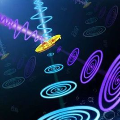Differential privacy has been an exceptionally successful concept when it comes to providing provable security guarantees for classical computations. More recently, the concept was generalized to quantum computations. While classical computations are essentially noiseless and differential privacy is often achieved by artificially adding noise, near-term quantum computers are inherently noisy and it was observed that this leads to natural differential privacy as a feature. In this work we discuss quantum differential privacy in an information theoretic framework by casting it as a quantum divergence. A main advantage of this approach is that differential privacy becomes a property solely based on the output states of the computation, without the need to check it for every measurement. This leads to simpler proofs and generalized statements of its properties as well as several new bounds for both, general and specific, noise models. In particular, these include common representations of quantum circuits and quantum machine learning concepts. Here, we focus on the difference in the amount of noise required to achieve certain levels of differential privacy versus the amount that would make any computation useless. Finally, we also generalize the classical concepts of local differential privacy, Renyi differential privacy and the hypothesis testing interpretation to the quantum setting, providing several new properties and insights.
翻译:差分隐私已经成为为经典计算提供可证明安全性保障的一个非常成功的概念。最近,该概念被推广到量子计算。虽然经典计算本质上是无噪声的,并且差分隐私通常是通过人为添加噪声来实现的,但近期的量子计算机本质上是有噪声的,并且我们观察到这导致了自然差分隐私作为一种特征。在本文中,我们将量子差分隐私讨论在一个信息论框架中,通过将其作为量子散度进行转换。这种方法的主要优点是差分隐私成为仅基于计算的输出状态的属性,无需针对每次测量进行检查。这导致简化了证明并推广了差分隐私的性质,以及针对一般和特定的噪声模型提供了一些新的界限。特别是,这包括量子电路和量子机器学习概念的常见表示。在这里,我们着重讨论了实现某些差分隐私水平所需的噪声量与使任何计算无用所需的噪声量之间的差异。最后,我们还将局部差分隐私、Renyi差分隐私和假设检验解释的经典概念推广到量子设置中,提供了一些新的性质和见解。


